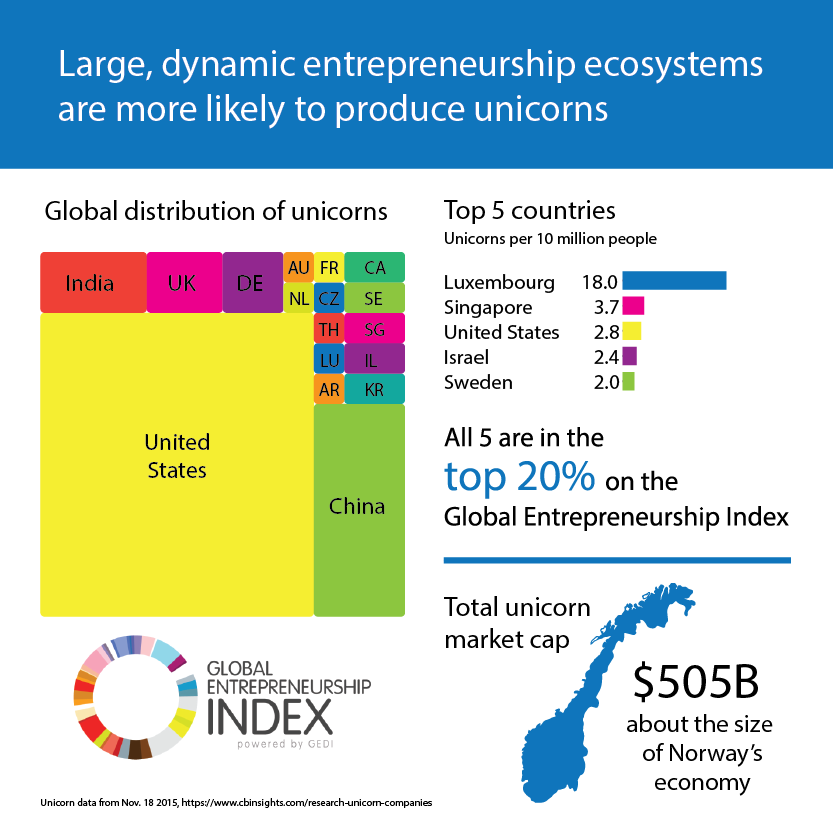In the animal kingdom of entrepreneurship over the years different beasts have dominated. From ubiquitous mouse to the mythical unicorn, animals in the entrepreneurship kingdom are all around us. Our four animals are mice, gazelles, elephants and unicorns.
Mice are everywhere. They are the solo self-employed street vendors that we find in both developed and developing countries by the millions. They add very little to the economy in terms of employment, innovation or productivity growth.
Gazelles are medium sized businesses that grow rapidly and create employment. Gazelles are the main engines of job creation in the economy in most countries. These animals are swift, avoid predators, and multiply if they get enough to eat. These animals are not small but are nimble and adapt to changing environments easily.
Elephants are very large animals. They are like our large corporations. Stable, steady and sure footed. They are essential to the economy, not because of job creation but because of efficiency. These animals are large because they are able to survive and grow. Their main contribution to the economy is productivity growth creating more with the same amount of inputs year in and year out.
But where does wealth come from? Wealth is what determines how well off we are as individuals and as a nation. Wealth is created by unicorns. A unicorn is a tech startup that is valued at a billion dollars or more. Unicorns were the stuff of myths. It wasn’t long ago that the idea of a pre-IPO tech startup with a $1 billion market value was a fantasy. Google was never worth $1 billion as a private company. Neither was Amazon nor any other alumnus of the original dotcom class.
While mice, gazelles and elephants have been around for decades, unicorns are new. The term was coined by Aileen Lee in a November 2013 TechCrunch blog post. Today the technology industry is crowded with billion-dollar startups. While in 2013 there we only 39 of the VC-backed U.S software startups that topped the $1 billion valuation mark today there are at least 80 in the U.S. alone. The rise of the unicorn has occurred rapidly and without much warning, and it’s starting to raise eyebrows.
Some of these companies are already household names whose services are being used by millions of people. Uber, the ride sharing business, is valued at $41 billion higher than the market capitalization of at least 70% of the companies on the fortune 500 list. Other household names are AirBnb, Snapchat and Dropbox. Each one valued in the billions of dollars.
What is even more surprising is that unicorns have been spotted not just in the U.S. but in many countries around the world. China has 21, India has 7 and the United Kingdom has 5. Many others are scattered around other countries. Of course this raises an interesting question – which country is more entrepreneurial today? Does the number of unicorns tell us something important about the entrepreneurial prowess of a country? On a recent visit to Denmark, I was asked if Denmark is so entrepreneurial why does Sweden have two unicorns and Denmark none? This is great question.
So we put together some data to try and answer the question of who is the most entrepreneurial country in the world based on the number of unicorns instead of the number of mice. If we look only at the number of mice, the poorest country looks the most entrepreneurial because high rates of self-employment are often found in developing economies. But this self-employment is often necessity-driven, and not what we really mean when we talk about wealth-generating entrepreneurship. If we look at the distribution of unicorns around the world we see that the United States leads, followed by China, India, United Kingdom, Germany Canada, Sweden, Israel, Singapore and South Korea. But these countries have vastly different population numbers – and the odds of seeing a unicorn are higher when there environment is larger. China has a billion people and Sweden a mere 10 million. So who is on top?
If we look at the number of unicorns per 10 million people the top 5 countries are Luxembourg with 18 unicorns per ten million people, followed by Singapore with 3.7 unicorns per 10 million people, the United States with 2.8 unicorns per 10 million people followed by Israel with 2.4 and Sweden with 2. However, while Singapore, the United States, Israel and Sweden are more or less similar in terms of creating unicorns Luxembourg is at least five times as entrepreneurial at the rest of us in per capita terms.
Further, we see that large, dynamic entrepreneurial ecosystems are more likely to produce unicorns. All 5 are in the top 20% on the Global Entrepreneurship Index. But Luxembourg is the most entrepreneurial country by this measure.


South Korea, China, Thailand and India have all produced unicorns. Will Asia continue to innovate and contribute additional unicorns to the global balance, or will another region emerge next? What countries do we expect to join the unicorn list soon?
The problem with unicorns are that these are private valuations. How many will be worth a billion in 5 years? Is this a global bubble that is now leaking air? Deal flow is going down… Last investors in unicorns as fools?